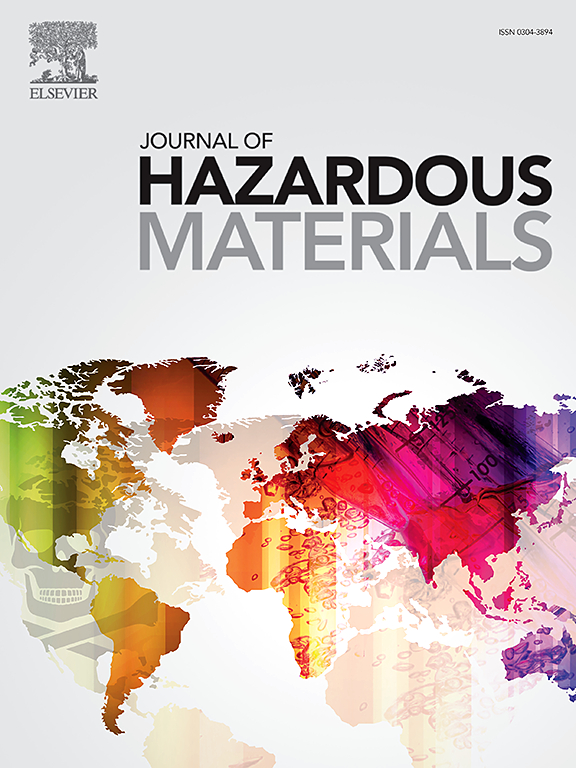堆肥过程中的生物气溶胶排放特征和潜在风险:关注病原体和抗菌剂耐药性
IF 12.2
1区 环境科学与生态学
Q1 ENGINEERING, ENVIRONMENTAL
引用次数: 0
摘要
在这项研究中,我们采用撞击培养法和元基因组测序法分析了堆肥过程中生物气溶胶的排放特征和潜在的抗菌药耐药性(AMR)风险。结果表明,排放气体中的高饱和水蒸气减轻了嗜热期的颗粒物排放。关于生物气溶胶,随着堆肥进入成熟期,空气中好氧细菌的排放受到抑制,空气中的真菌通常以单细胞或小细胞聚集体(< 3.3 μm)的形式存在。此外,生物气溶胶中的微生物群落结构稳定,与堆肥时间无关。最重要的是,生物气溶胶中的 PM2.5 含有大量抗生素耐药基因(ARGs)、潜在病原体和耐多药病原体,它们种类繁多,浓度较高。其中,编码 21 种抗生素的 ARGs 浓度介于 -4.50 至 0.70 ppm/m3 之间(Log10 ARGs)。在检测到的 89 种潜在人类病原体中,大肠埃希氏菌、肠炎沙门氏菌、肺炎克雷伯氏菌和金黄色葡萄球菌是唯一可培养的潜在耐多药病原体,它们携带多种 ARGs,编码高浓度抗药性(-0.57 至 1.15 ppm/m3 (Log10 ARGs)),并且更有可能在低营养环境中存活和繁殖。我们的研究结果表明,堆肥技术可将 AMR 从固体堆肥转移到气相中,并增加 AMR 传播的风险。本文章由计算机程序翻译,如有差异,请以英文原文为准。

Bioaerosol emission characteristics and potential risks during composting: Focus on pathogens and antimicrobial resistance
In this study, we analyzed bioaerosol emission characteristics and potential risks of antimicrobial resistance (AMR) during composting using the impaction culture method and metagenomic sequencing. The results showed that the highly saturated water vapor in the emission gas mitigated particulate matter emission during the thermophilic period. About the bioaerosols, the airborne aerobic bacterial emissions were suppressed as composting enters the mature period, and the airborne fungi are usually present as single-cell or small-cell aggregates (< 3.3 µm). In addition, the microbial community structure in bioaerosols was stable and independent of composting time. Most importantly, the PM2.5 in bioaerosols contained large amounts of antibiotic resistance genes (ARGs), potential pathogens, and multidrug resistant pathogens, which were diverse and present in high concentrations. Among them, ARGs concentrations encoding 21 antibiotics ranged from – 4.50 to 0.70 ppm/m3 (Log10 ARGs). Among the 89 potential human pathogens detected, Escherichia coli, Salmonella enterica, Klebsiella pneumoniae, and Staphylococcus aureus were the only culturable potentially multidrug resistant pathogens carrying multiple ARGs encoding resistance at high concentrations (– 0.57 to 1.15 ppm/m3 (Log10 ARGs)), and were more likely to persist and multiply in oligotrophic environments. Our findings indicate that composting technology can transfer AMR from solid compost to gas phase and increase the risk of AMR transmission.
求助全文
通过发布文献求助,成功后即可免费获取论文全文。
去求助
来源期刊

Journal of Hazardous Materials
工程技术-工程:环境
CiteScore
25.40
自引率
5.90%
发文量
3059
审稿时长
58 days
期刊介绍:
The Journal of Hazardous Materials serves as a global platform for promoting cutting-edge research in the field of Environmental Science and Engineering. Our publication features a wide range of articles, including full-length research papers, review articles, and perspectives, with the aim of enhancing our understanding of the dangers and risks associated with various materials concerning public health and the environment. It is important to note that the term "environmental contaminants" refers specifically to substances that pose hazardous effects through contamination, while excluding those that do not have such impacts on the environment or human health. Moreover, we emphasize the distinction between wastes and hazardous materials in order to provide further clarity on the scope of the journal. We have a keen interest in exploring specific compounds and microbial agents that have adverse effects on the environment.
 求助内容:
求助内容: 应助结果提醒方式:
应助结果提醒方式:


